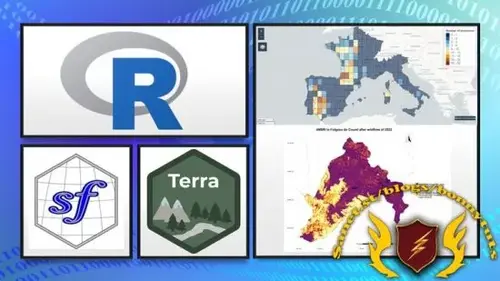Introduction to Spatial Data Analysis and GIS in R
Learn GIS from 0 in R with theory and practice, using sf, terra, mapview, and much more for vector and raster analysis!

What you'll learn:
Understand the difference between Spatial Data and Non-Spatial Data
Read/Write different Spatial Data formats
Extract properties from spatial data
Understand how the Coordinates Reference Systems (CRS) work
Work with Spatial Filters and Spatial Joins
Understand the spatial predicates (crosses, contains, intersects ...)
Generate Maps and Web Maps
Work with geometry transformations (buffer, centroid, intersection, crop, ...)
Requirements:
Basic knowledge of R programming is highly recommended.
Feel comfortable with tidyverse functions, including basic ggplot2 graphs and the pipeline (%>% or |>)
Description:
Welcome to my Spatial Data Analysis in R course!
This course is designed for beginners and intermediate-level individuals who want to delve into the fascinating world of spatial data analysis using the R programming language. We will focus on the latest packages and practices for working with real-world spatial data.Course Content:Section 01: Introduction to Spatial DataGet to know the essential fundamentals of spatial data analysis.Learn to handle spatial data in R.Section 02: Coordinate Reference Systems Explore coordinate reference systems and their importance in spatial analysis.Section 03: Geometric OperationsLearn to perform key operations with geometries, including spatial filters, spatial joins, spatial predicates, and transformations like centroids and buffers.Section 04: Raster Data Learn what raster data is and the most common tasks with this type of data.
This section includes a brief introduction to remote sensing.Section 05: Maps with ggplot2 Master the creation of amazing maps using ggplot2. Unify your prior skills to effectively visualize spatial data.Section 06: Web Maps Take your visualizations to the next level by creating interactive web maps with mapview and leaflet extensions, including synchronized maps.Course Details:Duration: Approximately 14 hours and 30 minutes.Lessons: Over 150 lessons that will guide you from basics to advanced techniques in spatial data analysis in R.Teaching Mode:Theory and Theory Quizzes Guided Practices Proposed Exercises with Solutions This course is intensive, starting from the basics and taking you to acquire advanced skills in spatial data analysis and visualization. Upon completion, you will not only be an intermediate user but an expert with solid knowledge in the exciting field of spatial analysis.I invite you to join me and explore the power of R in spatial data analysis!
Hope to see you in class!
Who this course is for:
GIS Analysts/Technicians
Environmental Scientists
Geographers
Geospatial Data Scientists
Cartographers
Remote Sensing Specialists
Foresters and Natural Resource Managers
Anyone interested in Spatial Data with R
Published 1/2024
Created by Adrian Cidre Gonzalez
MP4 | Video: h264, 1280x720 | Audio: AAC, 44.1 KHz, 2 Ch
Genre: eLearning | Language: English | Duration: 151 Lectures ( 12h 53m ) | Size: 9.32 GB
Download
*
Learn GIS from 0 in R with theory and practice, using sf, terra, mapview, and much more for vector and raster analysis!

What you'll learn:
Understand the difference between Spatial Data and Non-Spatial Data
Read/Write different Spatial Data formats
Extract properties from spatial data
Understand how the Coordinates Reference Systems (CRS) work
Work with Spatial Filters and Spatial Joins
Understand the spatial predicates (crosses, contains, intersects ...)
Generate Maps and Web Maps
Work with geometry transformations (buffer, centroid, intersection, crop, ...)
Requirements:
Basic knowledge of R programming is highly recommended.
Feel comfortable with tidyverse functions, including basic ggplot2 graphs and the pipeline (%>% or |>)
Description:
Welcome to my Spatial Data Analysis in R course!
This course is designed for beginners and intermediate-level individuals who want to delve into the fascinating world of spatial data analysis using the R programming language. We will focus on the latest packages and practices for working with real-world spatial data.Course Content:Section 01: Introduction to Spatial DataGet to know the essential fundamentals of spatial data analysis.Learn to handle spatial data in R.Section 02: Coordinate Reference Systems Explore coordinate reference systems and their importance in spatial analysis.Section 03: Geometric OperationsLearn to perform key operations with geometries, including spatial filters, spatial joins, spatial predicates, and transformations like centroids and buffers.Section 04: Raster Data Learn what raster data is and the most common tasks with this type of data.
This section includes a brief introduction to remote sensing.Section 05: Maps with ggplot2 Master the creation of amazing maps using ggplot2. Unify your prior skills to effectively visualize spatial data.Section 06: Web Maps Take your visualizations to the next level by creating interactive web maps with mapview and leaflet extensions, including synchronized maps.Course Details:Duration: Approximately 14 hours and 30 minutes.Lessons: Over 150 lessons that will guide you from basics to advanced techniques in spatial data analysis in R.Teaching Mode:Theory and Theory Quizzes Guided Practices Proposed Exercises with Solutions This course is intensive, starting from the basics and taking you to acquire advanced skills in spatial data analysis and visualization. Upon completion, you will not only be an intermediate user but an expert with solid knowledge in the exciting field of spatial analysis.I invite you to join me and explore the power of R in spatial data analysis!
Hope to see you in class!
Who this course is for:
GIS Analysts/Technicians
Environmental Scientists
Geographers
Geospatial Data Scientists
Cartographers
Remote Sensing Specialists
Foresters and Natural Resource Managers
Anyone interested in Spatial Data with R
Published 1/2024
Created by Adrian Cidre Gonzalez
MP4 | Video: h264, 1280x720 | Audio: AAC, 44.1 KHz, 2 Ch
Genre: eLearning | Language: English | Duration: 151 Lectures ( 12h 53m ) | Size: 9.32 GB
Download
*